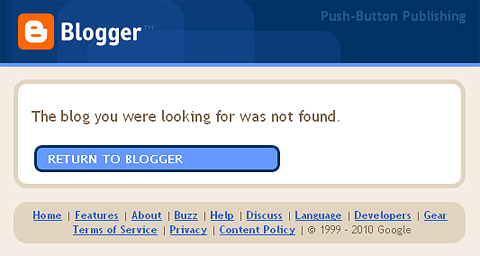At Your Own Risk! - Why Commercial Social Platforms are usually Safer than Free Ones

Everyone is familar with free Internet Social Services - the ones I am talking about here of are course Social Community and Media services like Blogger, YouTube, Flickr and Facebook. They are open to everyone, and anyone can set up their own accounts and utilise those services to create personal spaces where they can promote and share content and media with family, friends, consumers and other interested parties.
There’s always a lot of furore whenever Facebook tries to alter its terms & conditions, but regardless of what its users might think - Facebook totally owns the metaphorical land you build your Facebook pages on - and they set the planning regulations. You need to consider these sites as potentially short-term leases of real estate, where the owner / landlord can action new clauses at any time - which at their most extreme can result in the complete demolition and removal of your online property - much like if you had added a conservatory or tennis court to your propety without local authority planning permission - only here the regulations are more one-sided and more prone to sudden and preemptive changes.
A recent case in point is this week’s activity on Google’s Blogger platform where ’Music Blogocide 2010’(as certain Journos are calling it) was perpetrated. It all revolves around a fairly poorly defined act of United States legislation called the ’Digital Millenium Copyright Act’ (DMCA) which seeks to regulate, criminalize and punish those individuals or organisations who illegally promote media content outside the bounds of DRM (Digital Rights Management) and without the copyright owner’s permission.
Whenever Google (the owner of the Blogger platform) receives negative reports / complaints about a particular site, they must decide whether the site is flaunting the DMCA code, and whether its services need to be suspended. Within normal legal procedures and protocols, the accused / defendant has a right to due legal process and right to reply (of course it helps to read Terms & Conditions also!); a big part of this issue is knowing what content has been targeted / reported on, and who has lodged the complaint. What happened this last Tuesday certainly seems to have contravened those principles, as numerous sites were taken down fairly instantly - with little or no warning and no allowance for right to reply / redress.
It is true that many of these sites were very obviously in breach of copyright law and were posting commercial MP3s for the benefit of free downloads. However, many legitimate sites were taken down also - where those sites only posted promotional MP3s supplied directly by the artist or label or official promoter for said artist or label. There have been numerous cases when DMCA has been enacted on totally official and fully endorsed record-label backed sites and releases, in some instances the DMCA has even been directed at Official Artist’s blogs / sites where they were simply posting promotional MP3s of their own music. Even more amusingly, DMCA’s seem to have been targeted at sites long after the contested content has been removed.
One of the big issues within all of this is the lack of transparency in the process. In a large number of cases, the defendant is not told which tracks have been reported for DMCA violation, and who has done the reporting. If the incumbent then fails to be take down this actual record label sanctioned content; mostly supplied directly from the record label, the whole site is suspended. This exact same thing happened to rock blog - ’I Rock Cleveland’ where it was discovered that there were at least 4 recent DMCA enactments - all made against legitimate tracks supplied to the site by the record label / copyright owner of the music. The worst thing about this is the lack of ’right to reply’; the site owner has to be allowed to respond to reports of copyright theft or abuse, and must be given reasonable terms to remove or justify reported / suspect content. On Tuesday, suspected ’infringement’ Bloggers were sent the following email AFTER their sites had been taken down:
"We’d like to inform you that we’ve received another complaint regarding your blog (http://______.blogspot.com/). Upon review of your account, we’ve noted that your blog has repeatedly violated Blogger’s Terms of Service (http://www.blogger.com/terms.g). Given that we’ve provided you with several warnings of these violations and advised you of our policy towards repeat infringers, we’ve been forced to remove your blog.
Thank you for your understanding.
Sincerely,
The Blogger Team"
The upside of the Internet is that if you are clever, you back up your content regularly, and as in the case of ’I Rock Cleveland’ you simply port all your recently backed-up content over to another platform (WordPress in this instance). The real downside though can be in the loss of casual browsers of the old site (your readership / customers), as well as the loss of an invaluable SEO ranking which has taken several years to mature and build up to a significant network footprint.
Over the years there have been all kinds of incidents with free service platforms - various changes in the platforms codebase and functionality which remove or limit or radically change certain key services, often causing partial or complete demise for the individuals or enterprises utilising those particular services. With a commercial proprietary platform - you do have to pay, but you obviously have more rights, and will be far less prone to unsettling imposed changes, or even suspension of the service platform; most importanly, if you own the licence, then you own the ’real estate’ you build on, and you set the planning regulations. Moreover, in controlling and owning your own space on the Internet, you also own the relationship with your customers. On Facebook, Yahoo, Blogger et al, you are simply just a squatter on someone else’s property - and if they want to, they can evict you at any time, and they end up owning your contact base and customer relationships ... so beware!

Did you find this content useful?
Thank you for your input
Thank you for your feedback
Upcoming and Former Events
Affino Innovation Briefing 2024
Webinar - Introduction to Affino's Expert AI Solutions - Session #2
Webinar - Introduction to Affino's Expert AI Solutions - Session #1
PPA Independent Publisher Conference and Awards 2023
Meetings:
Google Meet and Zoom
Venue:
Soho House, Soho Works +
Registered Office:
55 Bathurst Mews
London, UK
W2 2SB
© Affino 2024
















